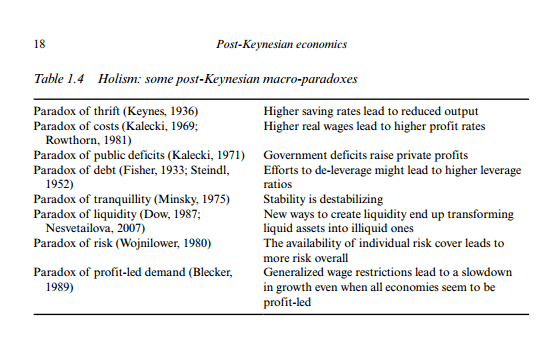In the last post, Effective Demand And The Labour Market, I argued how the effect of raising minimum wages on employment is straightforward—it’s beneficial. This seems contradictory to the “intuition”—which it is not really, it’s learning to think like an economist—which suggests that raising wages will lead to unemployment.
Economists have been struggling to find answers to analysis which do not find empirical support. But they needn’t, as explanations are already available. You just need to take the Keynesian principle of effective demand more seriously.
Keynes highlighted the paradox of thrift — reduction in the propensity to consume (or rise in the propensity to save) leads to a fall in output. This goes against intuition, which considers saving as only positive. Of course the solution is to not promote a policy in which consumers spend like crazy. So fiscal policy has to be relaxed if consumers want to save a lot.
And there are other paradoxes such as the paradox of costs, which is related to the discussion on wages, profits, output and employment in the previous post. Here’s a table from Marc Lavoie’s fantastic book, Post-Keynesian Economics: New Foundations.
Marc Lavoie’s list of macro paradoxes
Intuition derived out of learning New Consensus Economics will lead one to believe that raising real wages will lead to a fall in profit rates. Michal Kalecki highlighted that this isn’t the case. As Marc Lavoie says, “what seems reasonable for a single individual or nation leads to unintended consequences or even to irrational collective behaviour when all individuals act in a similar way.”
Further, Marc Lavoie says:
The paradox of costs, in its static version, says that a decrease in real wages will not raise the profits of firms and will instead lead to a fall in the rate of employment. This was explained by Kalecki in a Polish paper first written in 1939, where he concluded that ‘one of the main features of the capitalist system is the fact that what is to the advantage of a single entrepreneur does not necessarily benefit all entrepreneurs as a class’. Its dynamic version has been proposed by Robert Rowthorn. It says that rising real wages (relative to productivity) can generate higher profit rates. This flies in the face of a microeconomic analysis that would demonstrate that lower profit margins generate lower profit rates. But if higher real wages generate higher aggregate consumption, higher sales, higher rates of capacity utilization and hence higher investment expenditures, profit rates will be driven up.
So while it may be beneficial to an individual firm to reduce wages and get a higher profit rate, it will be the reverse if everyone tries to do it.
For a fantastic discussion of these paradoxes, refer to the book Post-Keynesian Economics: New Foundations. Chapter 1 can be accessed for free at the publisher’s website.
